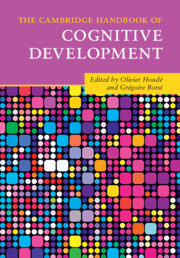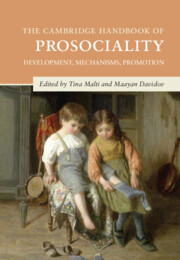The Cambridge Handbook of Cognitive Development
$67.99 (P)
Part of Cambridge Handbooks in Psychology
- Editors:
- Olivier Houdé, Université de Paris V
- Grégoire Borst, Université de Paris V
- Date Published: March 2022
- availability: Available
- format: Paperback
- isbn: 9781108436632
$
67.99
(P)
Paperback
Other available formats:
Hardback, eBook
Looking for an examination copy?
This title is not currently available for examination. However, if you are interested in the title for your course we can consider offering an examination copy. To register your interest please contact [email protected] providing details of the course you are teaching.
-
How does cognition develop in infants, children and adolescents? This handbook presents a cutting-edge overview of the field of cognitive development, spanning basic methodology, key domain-based findings and applications. Part One covers the neurobiological constraints and laws of brain development, while Part Two covers the fundamentals of cognitive development from birth to adulthood: object, number, categorization, reasoning, decision-making and socioemotional cognition. The final Part Three covers educational and school-learning domains, including numeracy, literacy, scientific reasoning skills, working memory and executive skills, metacognition, curiosity-driven active learning and more. Featuring chapters written by the world's leading scholars in experimental and developmental psychology, as well as in basic neurobiology, cognitive neuroscience, computational modelling and developmental robotics, this collection is the most comprehensive reference work to date on cognitive development of the twenty-first century. It will be a vital resource for scholars and graduate students in developmental psychology, neuroeducation and the cognitive sciences.
Read more- Features a broad range of approaches, from neurobiology to developmental psychology and education
- Makes new discoveries and theories on cognitive development accessible to researchers and graduate students in neuroscience and psychology
- Translates basic science on cognitive development to applications at school, and provides principles for evidence-based neuroeducation
Reviews & endorsements
'Anyone interested in cognitive development writ large should enjoy this marvelous survey of the field. The editors have assembled a remarkable set of chapters that are comprehensive and stimulating, full of facts, theories and wisdom. This collection not only conveys the essential discoveries and insights of the past but also provides rich glimpses of where numerous research programs are headed. This handbook should grace the shelves of anyone who is even remotely interested in this field.' Stephen M. Kosslyn, Honorary Dean for the Social Sciences, Harvard University, USA
See more reviews'This handbook will be the definitive resource for novice and seasoned researchers. Rooted in Piagetian constructivism, leaders in the field discuss contemporary approaches to cognitive development, highlighting periods of growth and regression throughout the lifespan. From brain research to empirical observation, this volume provides the rich, theoretical tapestry currently shaping the discipline.' Stuart Marcovitch, Professor of Psychology, University of North Carolina at Greensboro, USA
'This comprehensive and impressive volume situates the current thinking in cognitive development in historical and philosophical context. Characterizing the last 40 years of cognitive developmental research as fundamentally interdisciplinary, the editors bring together research in neurobiology, experimental psychology, computational modelling, comparative psychology, and educational application. The expert contributors present accessible chapters integrating theory and empirical evidence throughout. This extensive overview of current work will be of value to those working in the field, especially those starting out, as well as researchers in other disciplines who want to understand contemporary thought in cognitive development.' Sarah Beck, Professor of Cognitive Development, University of Birmingham, UK
Customer reviews
Not yet reviewed
Be the first to review
Review was not posted due to profanity
×Product details
- Date Published: March 2022
- format: Paperback
- isbn: 9781108436632
- length: 800 pages
- dimensions: 244 x 169 x 40 mm
- weight: 1.32kg
- availability: Available
Table of Contents
Part I. Neurobiological Constraints and Laws of Cognitive Development:
1. How life regulation and feelings motivate the cultural mind: a neurobiological account
2. Epigenesis, synapse selection, cultural imprints and human brain development: from molecules to cognition
3. Mapping the human brain from the preterm period to infancy using 3D magnetic resonance imaging: cortical folding and early maturation processes
4. Development and maturation of the human brain from infancy to adolescence
5. Genetic and experiential factors in brain development: the examples of executive attention and self-regulation
6. The brain basis underlying the transition from adolescent to adulthood
Part II. Fundamentals of Cognitive Development from Infancy to Adolescence and Young Adulthood:
7. Differences between humans, great apes and monkeys in cognition, communication, language and morality
8. Individuating and physical reasoning about objects in infancy
9. Infant categorization
10. Infant numerical cognition: does primitive number sense provide a foothold for learning formal mathematics?
11. How sophisticated is infants' theory of mind?
12. Social cognition and moral evaluation in early human childhood
13. Scientific thinking and reasoning in infants and young children
14. Computational approaches to cognitive development in infancy: Bayesian and artificial-neural-network models
15. Development of qualitative thinking: language and categorization
16. Development of numerical knowledge
17. Numerical cognition and executive functions: development as progressive inhibitory control of misleading visuospatial dimensions
18. Developing theory of mind and counterfactual reasoning in children
19. Development of executive function skills in childhood: relevance for important life-outcomes
20. Developing executive functions and flexible adaptation during childhood
21. Reasoning bias and dual process theory: developmental considerations and current directions
22. Social cognitive development: the intergroup context
23. Behavioral and neural development of cognitive control and risky decision-making across adolescence
24. The Triadic neural systems model through a machine-learning
Part III. Education and School-learning Domains:
25. Linking cognitive neuroscientific research to educational practice in the classroom
26. Literacy: understanding normal and impaired reading development through personalized large-scale neurocomputational models
27. Reasoning in mathematical development: neurocognitive foundations and their implications for the classroom
28. Children's scientific reasoning skills in light of general cognitive development
29. Working memory training: from the laboratory to schools
30. Interventions for improving executive functions during development: working memory, cognitive flexibility and inhibition
31. Curiosity-driven learning in development: computational theories and educational applications
32. Neurocomputational methods: from models of brain and cognition to artificial intelligence in education.
Sorry, this resource is locked
Please register or sign in to request access. If you are having problems accessing these resources please email [email protected]
Register Sign in» Proceed
You are now leaving the Cambridge University Press website. Your eBook purchase and download will be completed by our partner www.ebooks.com. Please see the permission section of the www.ebooks.com catalogue page for details of the print & copy limits on our eBooks.
Continue ×Are you sure you want to delete your account?
This cannot be undone.
Thank you for your feedback which will help us improve our service.
If you requested a response, we will make sure to get back to you shortly.
×






